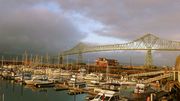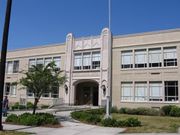Astoria, Oregon
| Astoria, Oregon | |||
|---|---|---|---|
| — City — | |||
|
|
|||
|
|||
 |
|||
| Coordinates: | |||
| Country | United States | ||
| State | Oregon | ||
| County | Clatsop | ||
| Incorporated | 1876 | ||
| Government | |||
| - Mayor | Willis L. Van Dusen | ||
| Area | |||
| - Total | 10.6 sq mi (27.5 km2) | ||
| - Land | 6.1 sq mi (15.9 km2) | ||
| - Water | 4.5 sq mi (11.6 km2) | ||
| Elevation | 23 ft (7.01 m) | ||
| Population (2007) | |||
| - Total | 10,045 | ||
| - Density | 1,597.6/sq mi (617.1/km2) | ||
| Time zone | PST (UTC-8) | ||
| - Summer (DST) | PDT (UTC-7) | ||
| ZIP code | 97103 | ||
| Area code(s) | 503 | ||
| FIPS code | 41-03150[1] | ||
| GNIS feature ID | 1117076[2] | ||
| Website | www.astoria.or.us | ||
The city of Astoria is the county seat of Clatsop County, Oregon, United States.[3] Situated near the mouth of the Columbia River, the city was named after the American investor (and first millionaire) John Jacob Astor. His American Fur Company founded Fort Astoria at the site in 1810. Astoria was incorporated by the Oregon Legislative Assembly on October 20, 1876.[4]
Located on the south shore of the Columbia, the city is served by the Port of Astoria with a deep-water port. Transportation includes the Astoria Regional Airport with U.S. Route 30 and U.S. Route 101 as the main highways, and the 4.2 mile Astoria – Megler Bridge connecting to neighboring Washington across the river. The population was 9,813 at the 2000 census. As of 2007, the state estimate raised it to 10,045 residents.[5]
Contents |
History



The Lewis and Clark Expedition spent the winter of 1805–1806 at Fort Clatsop, a small log structure south and west of modern day Astoria. The expedition had hoped a ship would come by to take them back east, but instead endured a torturous winter of rain and cold, then returned east the way they came. Today the fort has been recreated and is now a national monument.
In 1810, John Jacob Astor's Pacific Fur Company sent the Astor Expedition that founded Fort Astoria as its primary fur-trading post in the Northwest, and in fact the first permanent U.S. settlement on the Pacific coast. It was an extremely important post for American exploration of the continent and was influential in establishing American claims to the land.
British explorer David Thompson was the first European to navigate the entire length of the Columbia River in 1811. Thompson reached the partially constructed Fort Astoria at the mouth of the Columbia, arriving two months after the Pacific Fur Company's ship, the Tonquin.[6]
The Pacific Fur Company failed, however, and the fort and fur trade were sold to the British in 1813. The house was restored to the U.S. in 1818, though the fur trade would remain under British control until American pioneers following the Oregon Trail began filtering into the port town in the mid-1840s. The Treaty of 1818 established joint U.S. – British occupancy of territory west of the continental divide to the Pacific Ocean. In 1846 the Oregon Treaty ended the Oregon Boundary Dispute; with Britain ceding all right to the mainland south of the 49th parallel north.
Washington Irving, a prominent American writer with a European reputation, was approached by John Jacob Astor to mythologize the three-year reign of his Pacific Fur Company. Astoria (1835), written while Irving was Astor's guest, cemented the importance of the region in the American psyche.[7] In Irving's words, the fur traders were "Sinbads of the wilderness", and their venture was a staging point for the spread of American economic power into both the continental interior and into the Pacific.
As the Oregon Territory grew and became increasingly more settled, Astoria likewise grew as a port city at the mouth of the great river that provided the easiest access to the interior. The first U.S. Post Office west of the Rocky Mountains was established in Astoria in 1847. In 1876, the community was incorporated by the state.
Astoria attracted a host of immigrants beginning in the late-nineteenth century: Scandinavian settlers, primarily Finns, and Chinese soon became significant parts of the population. The Finns mostly lived in Uniontown, near the present-day end of the Astoria-Megler Bridge, and took fishing jobs; the Chinese tended to do cannery work, and usually lived either downtown or in bunkhouses near the canneries. In 1883, and again in 1922, downtown Astoria was devastated by fire, partly because it was mostly wood and entirely raised off the marshy ground on pilings. Even after the first fire, the same format was used, and the second time around the flames spread quickly again, as collapsing streets took out the water system. Frantic citizens resorted to dynamite, blowing up entire buildings to stop the fire from going further.
Astoria has served as a port of entry for over a century and remains the trading center for the lower Columbia basin, although it has long since been eclipsed by Portland, Oregon and Seattle, Washington as an economic hub on the coast of the Pacific Northwest. Astoria's economy centered around fishing, fish processing, and lumber. In 1945, about 30 canneries could be found along the Columbia; however, in 1974 Bumblebee Seafood moved its headquarters out of Astoria, and gradually reduced its presence until 1980 when the company closed its last Astoria cannery. The timber industry likewise declined; Astoria Plywood Mill, the city's largest employer, closed in 1989, and the Burlington Northern and Santa Fe Railway discontinued service in 1996.
In 1966 the Astoria-Megler Bridge was opened; it completed U.S. Route 101 and linked Astoria with Washington on the opposite shore of the Columbia.
Today, tourism, Astoria's growing art scene, and light manufacturing are the main economic activities of the city. It is a port of call for cruise ships since 1982, after $10 million in pier improvements to accommodate cruise ships. To avoid Mexican ports of call during the Swine Flu outbreak of 2009, many cruises were re-routed to include Astoria. The residential community The World visited Astoria in June 2009.
In addition to the replicated Fort Clatsop, a popular point of interest is the Astoria Column, a tower 125 feet (38 m) high built atop the hill above the town, with an inner circular staircase allowing visitors to climb to see a panoramic view of the town, the surrounding lands, and the Columbia flowing into the Pacific. The column was built by the Astor family in 1926 to commemorate the region's early history.
Since 1998, artistically-inclined fishermen and women from Alaska and the Pacific Northwest have traveled to Astoria for the Fisher Poets Gathering, where poets and singers tell their tales to honor the fishing industry and lifestyle.
Astoria is also the western terminus of the TransAmerica Trail, a bicycle touring route created by the American Cycling Association.
Geography and climate
According to the United States Census Bureau, the city has a total area of 10.6 square miles (27 km2), of which, 6.1 square miles (15.8 km2) of it is land and 4.5 square miles (11.7 km2) of it (42.18%) is water.
Climate
Astoria lies within the Marine west coast climate zone (Koppen Cfb), with very mild temperatures year-round, some of the most consistent in the continental United States; winters are mild for Astoria's latitude, generally above freezing even at night, and wet. Summers are cool, although short heat waves can occur. Rainfall is most abundant in late fall and winter, and lightest in mid-late summer. Snowfall is relatively rare but can accumulate in small amounts in winter.
Annually, there is an average of only 0.5 day with maximum temperatures of 90 °F (32 °C) or higher. There are an average of 34.3 days with minimum temperatures of 32 °F (0 °C) or lower. The record high temperature was 101 °F (38 °C) on July 1, 1942. The record low temperature was 6 °F (−14 °C) on December 8, 1972.
There are an average of 194 days with measurable precipitation. The wettest year was 1950 with 113.34 inches (2,879 mm) and the driest year was 1985 with 41.58 inches (1,056 mm). The most rainfall in one month was 36.07 inches (916 mm) in December 1933. The most rainfall in 24 hours was 5.56 inches (141 mm) on November 25, 1998. The most snowfall in one month was 26.9 inches (680 mm) in January 1950.[8]
| Climate data for Astoria, Oregon (1971–2000) | |||||||||||||
|---|---|---|---|---|---|---|---|---|---|---|---|---|---|
| Month | Jan | Feb | Mar | Apr | May | Jun | Jul | Aug | Sep | Oct | Nov | Dec | Year |
| Source: NOAA [9] | |||||||||||||
Demographics
| Historical populations | |||
|---|---|---|---|
| Census | Pop. | %± | |
| 1860 | 252 |
|
|
| 1870 | 639 | 153.6% | |
| 1880 | 2,803 | 338.7% | |
| 1890 | 6,184 | 120.6% | |
| 1900 | 8,351 | 35.0% | |
| 1910 | 9,599 | 14.9% | |
| 1920 | 14,027 | 46.1% | |
| 1930 | 10,349 | −26.2% | |
| 1940 | 10,389 | 0.4% | |
| 1950 | 12,331 | 18.7% | |
| 1960 | 11,239 | −8.9% | |
| 1970 | 10,244 | −8.9% | |
| 1980 | 9,998 | −2.4% | |
| 1990 | 10,069 | 0.7% | |
| 2000 | 9,813 | −2.5% | |
| Est. 2007 | 9,879 | 0.7% | |
| source:[10][11] | |||
As of the census[1] of 2000, there were 9,813 people, 4,235 households, and 2,469 families residing in the city. The population density was 1,597.6 people per square mile (617.1 per km²). There were 4,858 housing units at an average density of 790.9 per square mile (305.5 per km²). The racial makeup of the city was:
- 91.08% White
- 0.52% Black or African American
- 1.14% Native American
- 1.94% Asian
- 0.19% Pacific Islander
- 2.67% from other races
- 2.46% from two or more races
5.98% of the population were Hispanic American or Latino of any race.
14.2% were of German, 11.4% Irish, 10.2% English, 8.3% United States or American, 6.1% Finnish, 5.6% Norwegian, and 5.4% Scottish ancestry according to Census 2000.
There were 4,235 households out of which 28.8% had children under the age of 18 living with them, 43.5% were married couples living together, 11.2% had a female householder with no husband present, and 41.7% were non-families. 35.4% of all households were made up of individuals and 13.6% had someone living alone who was 65 years of age or older. The average household size was 2.26 and the average family size was 2.93.
In the city the population was spread out with:
- 24.0% under the age of 18
- 9.1% from 18 to 24
- 26.4% from 25 to 44
- 24.5% from 45 to 64
- 15.9% 65 years of age or older.
The median age was 38 years. For every 100 females there were 92.3 males. For every 100 females age 18 and over, there were 89.9 males.
The median income for a household in the city was $33,011, and the median income for a family was $41,446. Males had a median income of $29,813 versus $22,121 for females. The per capita income for the city was $18,759. About 11.6% of families and 15.9% of the population were below the poverty line, including 22.0% of those under age 18 and 9.6% of those age 65 or over.
Education

The Astoria School District has four schools, each of which serves a different age group of students:
- John Jacob Astor Elementary School, for K-2;
- Lewis & Clark Elementary School, for 3–5;
- Astoria Middle School, for 6–8;
- Astoria High School for 9–12
Media
- The Daily Astorian
- KMUN
- KAST AM/FM
Astoria in popular culture
Shanghaied In Astoria is a musical about Astoria's history, that has been performed in Astoria every year since 1984.
Astoria was the setting of the 1985 movie The Goonies, which was filmed on location. Other movies filmed in Astoria include Overboard, Short Circuit, The Black Stallion, Kindergarten Cop, Free Willy, Free Willy 2: The Adventure Home, Teenage Mutant Ninja Turtles III, Benji the Hunted, The Ring,[12] The Ring Two, Into the Wild, The Guardian and Cthulhu.
The early 1960s television series Route 66 filmed the episode entitled "One Tiger to a Hill"[13] in Astoria; it was broadcast on September 21, 1962.
An album by the rock band The Ataris, So Long, Astoria, has cover art and a title song depicting the city.
Astoria is the first setting of the novel The Traveling Death and Resurrection Show by Ariel Gore.
Astoria is mentioned in Neal Stephenson's novel Snow Crash as the best place at that point in the novel to get to the USS Enterprise.
Astoria is also mentioned in the movie Eight Below; it is the current hometown of character Jerry Shepherd. Most recently it is mentioned in the movie about the Coast Guard The Guardian with Kevin Costner.
The monster movie It Came from Beneath the Sea (1955) has a reference to Astoria. The Navy tracks the beast (a giant Octopus), first to Astoria, where it attacks people on shore, leaving sucker imprints in the sand.
Other points of interest

- Columbia River Maritime Museum
- Peter Iredale shipwreck
- Astoria Regional Airport
- Clatsop Spit
- CGAS Astoria
Sister cities
Astoria has one sister city,[14] as designated by Sister Cities International:
 Walldorf, Germany, ostensibly from the Waldorf-Astoria Hotel
Walldorf, Germany, ostensibly from the Waldorf-Astoria Hotel
Notable residents
- Brian Bruney, Major League Baseball relief pitcher for the Washington Nationals
- Clark Gable, actor, began his career at the Astoria Theatre in 1922.[15]
- Michael Hurley, American Singer/Songwriter
- Ranald MacDonald, first man to teach the English language in Japan
- Holly Madison, one of Hugh Hefner's ex-girlfriends[16], born in Astoria but left before 2nd birthday
- Donald Malarkey, World War II U.S. Army soldier of the 101st Airborne Division was portrayed in the TV series Band of Brothers.
- Joshua Marquis, District Attorney
- Santeri Nuorteva, Finnish socialist politician and journalist, who edited Toveri ("The Comrade") in Astoria in 1912–1913.[17]
- Maila Nurmi, aka 1950s TV horror hostess Vampira and co-star of Ed Wood's Plan 9 From Outer Space attended Astoria High School in the late 1930s.[18]
Further reading
- MacGibbon, Elma (1904). Leaves of knowledge. Shaw & Borden Co. Elma MacGibbons reminiscences about her travels in the United States starting in 1898, which were mainly in Oregon and Washington. Includes chapter "Astoria and the Columbia River."
Footnotes
- ↑ 1.0 1.1 "American FactFinder". United States Census Bureau. http://factfinder.census.gov. Retrieved 2008-01-31.
- ↑ "US Board on Geographic Names". United States Geological Survey. 2007-10-25. http://geonames.usgs.gov. Retrieved 2008-01-31.
- ↑ "Find a County". National Association of Counties. http://www.naco.org/Template.cfm?Section=Find_a_County&Template=/cffiles/counties/usamap.cfm. Retrieved 2008-01-31.
- ↑ Leeds, W. H. (1899). "Special Laws". The State of Oregon General and Special Laws and Joint Resolutions and Memorials Enacted and Adopted by the Twentieth Regular Session of the Legislative Assembly (Salem, Oregon: State Printer): 747. http://books.google.com/?id=gsCwAAAAIAAJ&dq=%22ocean%20grove%22%20seaside%20oregon&pg=PA747.
- ↑ PSU:Population Research Center
- ↑ Meinig, D.W. (1995) [1968]. The Great Columbia Plain (Weyerhaeuser Environmental Classic ed.). University of Washington Press. pp. 37–38, 50. ISBN 0-295-97485-0.
- ↑ In his Introduction to the rambling work, Irving reports that Astor explicitly "expressed a regret that the true nature and extent of his enterprizeand its national character and importance had never been understood."
- ↑ http://www.wrcc.dri.edu/cgi-bin/cliMAIN.pl?or0324; http://www.wrcc.dri.edu/cgi-bin/cliMAIN.pl?or0328
- ↑ "Climatography of the United States No. 20 (1971–2000)" (PDF). National Oceanic and Atmospheric Administration. 2004. http://cdo.ncdc.noaa.gov/climatenormals/clim20/va/448906.pdf. Retrieved May 24, 2010.
- ↑ Moffatt, Riley. Population History of Western U.S. Cities & Towns, 1850–1990. Lanham: Scarecrow, 1996, 206.
- ↑ "Subcounty population estimates: Oregon 2000–2007" (CSV). United States Census Bureau, Population Division. March 18, 2009. http://www.census.gov/popest/cities/files/SUB-EST2007-41.csv. Retrieved May 3, 2009.
- ↑ The Ring (2002) – Filming locations
- ↑ "Route 66" One Tiger to a Hill (1962)
- ↑ Sister Cities International
- ↑ "Astoria Theatre Sign". http://www.flickr.com/photos/antiuser/426380299/in/set-72157600008412065/. Retrieved June 9, 2009.
- ↑ TMZ.com (October 7, 2008). "Holly to Hugh: Hef Off". http://www.tmz.com/2008/10/07/holly-to-hugh-hef-off/. Retrieved October 7, 2008.
- ↑ Paul George Hummasti, Finnish Radicals in Astoria, Oregon, 1904–1940: A Study in Immigrant Socialism. New York: Arno Press, 1979; pg. 44.
- ↑ "Vampira: The haunting of Astoria High School". The Daily Astorian. October 31, 2008. http://www.dailyastorian.com/Main.asp?SectionID=2&ArticleID=55578. Retrieved February 13, 2009.
See also
- The Finnish Socialists of Astoria
External links
 Media related to Astoria, Oregon at Wikimedia Commons
Media related to Astoria, Oregon at Wikimedia Commons- Astoria-Warrenton Chamber of Commerce
- Oregon Blue Book listing for Astoria
- Social and Economic History of Astoria
|
||||||||||||||
|
||||||||||||||||||||

